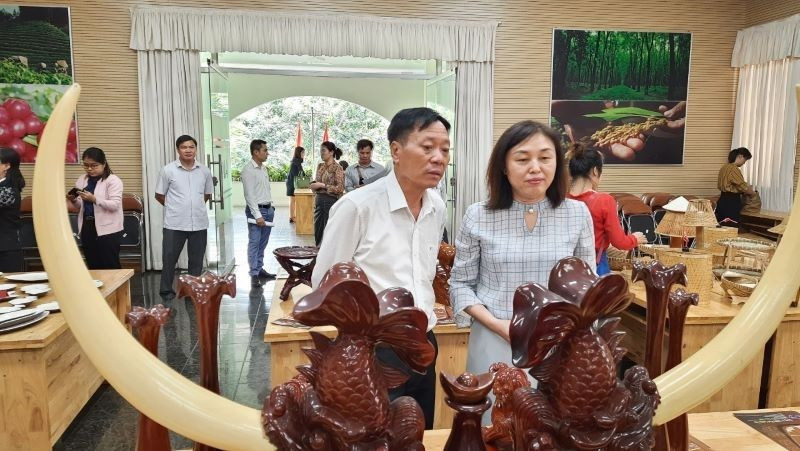Developing carbon market, moving towards a green economy
To maintain and expand export market share in Europe, businesses must comply with the European Union’s new regulations of Carbon Border Adjustment Mechanism (CBAM). This is not only a challenge but also an opportunity for Vietnamese businesses to enhance competitiveness and meet international standards.

According to experts, the European Union (EU) continues to be an important and promising export market for Viet Nam, including Ho Chi Minh City.
In the context of global efforts to transition towards a green and sustainable economy, the EU has implemented the CBAM to reduce greenhouse gas emissions and promote clean production.
According to Ho Thi Quyen, Deputy Director of the Ho Chi Minh City Centre for Trade Promotion and Investment, complying with new regulations such as CBAM is essential for maintaining and expanding market share in the EU.
The CBAM not only requires transparency regarding carbon emissions during the production process but also demands that enterprises adopt clean technologies and environmentally friendly production methods.
CBAM is currently in its transitional phase from October 1, 2023, until the end of 2025. During this period, exporters to the EU must report direct and indirect carbon emissions generated during production. From January 1, 2026, CBAM will officially take effect, requiring enterprises to purchase CBAM certificates corresponding to the amount of carbon emissions contained in their exported products.
CBAM currently applies to high-emission sectors such as steel, cement, fertilisers, aluminium and electricity. However, it is expected to be expanded to other fields in the future.
This places an urgent requirement on Vietnamese businesses to measure, report and verify greenhouse gas emissions accurately and transparently.
CBAM is a key instrument of the European Commission to promote decarbonisation. The mechanism complies with international policies and the EU’s legal obligations, including its compatibility with the World Trade Organisation (WTO).
Nina Miron Claudia, Policy Officer at the European Commission’s Directorate-General for Taxation and Customs Union (TAXUD).
According to Nina Miron Claudia, Policy Officer at the Directorate-General for Taxation and Customs Union (TAXUD), CBAM is a key instrument of the European Commission to promote decarbonisation. The mechanism complies with international policies and the EU’s legal obligations, including its compatibility with the World Trade Organisation (WTO).
To develop the carbon market in Viet Nam and contribute to achieving greenhouse gas emission reduction targets and promoting the green transition, the Prime Minister issued Decision No. 232/QD-TTg dated January 24, 2025 approving the Project on establishing and developing the carbon market.
Accordingly, Viet Nam will pilot an emissions trading system (ETS), creating a foundation for domestic carbon pricing and improving business competitiveness.
Experts emphasise that complying with CBAM is not only the responsibility of regulatory agencies but also requires proactive efforts from enterprises. The impact of CBAM on Vietnamese enterprises in general and those in Ho Chi Minh City in particular will be significant.
Businesses must invest in clean technologies, improve production processes, develop emission management systems and strengthen their capacity for reporting and verifying emission data.
The transition towards green production not only benefits each enterprise but also affects the entire supply chain. When a supplier reduces emissions, other businesses within the chain also move closer to the goal of achieving net-zero greenhouse gas emissions by 2050.
Nguyen Phuong Nam, PhD, General Director of Klinova Climate Innovation Consulting and Services Company, noted: “Overall, CBAM poses no small challenge for Vietnamese exporters, including increasingly stringent emission-reporting requirements, the complexity of data collection, and heightened competition as EU importers will prioritise low-emission goods.
Therefore, domestic businesses must actively study CBAM, review their production processes and develop greenhouse gas emission databases. This will enable them to plan effective emission-reduction measures, such as using renewable energy and optimising technologies.
With its sustainable development orientation, Viet Nam aims to achieve net-zero emissions by 2050. Reducing greenhouse gas emissions and establishing a carbon credit market in Viet Nam are urgent requirements.
With its sustainable development orientation, Viet Nam aims to achieve net-zero emissions by 2050. Reducing greenhouse gas emissions and establishing a carbon credit market in Viet Nam are urgent requirements.
To achieve this, Viet Nam must soon complete the legal framework for carbon market development; consider establishing a national coordinating body to manage, supervise and independently verify carbon credit-generating projects; and design tax incentives and financial support for businesses investing in certified emission-reduction projects.
At the same time, it is necessary to promote the development of the forest carbon market, as this is a strategic pathway for Viet Nam to fulfil its emission-reduction commitments and generate sustainable financing for forest protection and restoration.
However, for the forest carbon market to operate effectively and transparently, a comprehensive approach is required, based on global design principles and adapted to domestic conditions.








